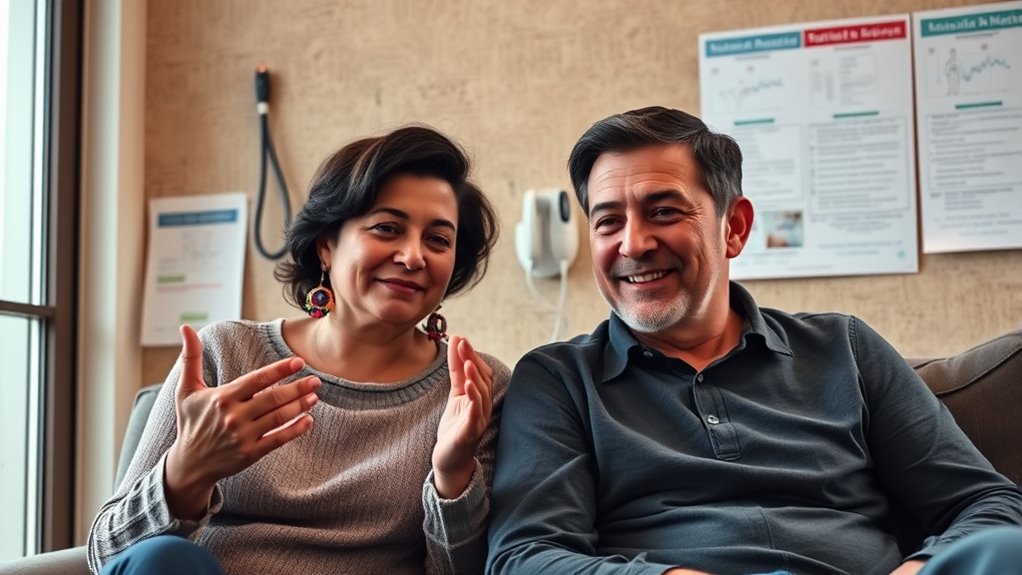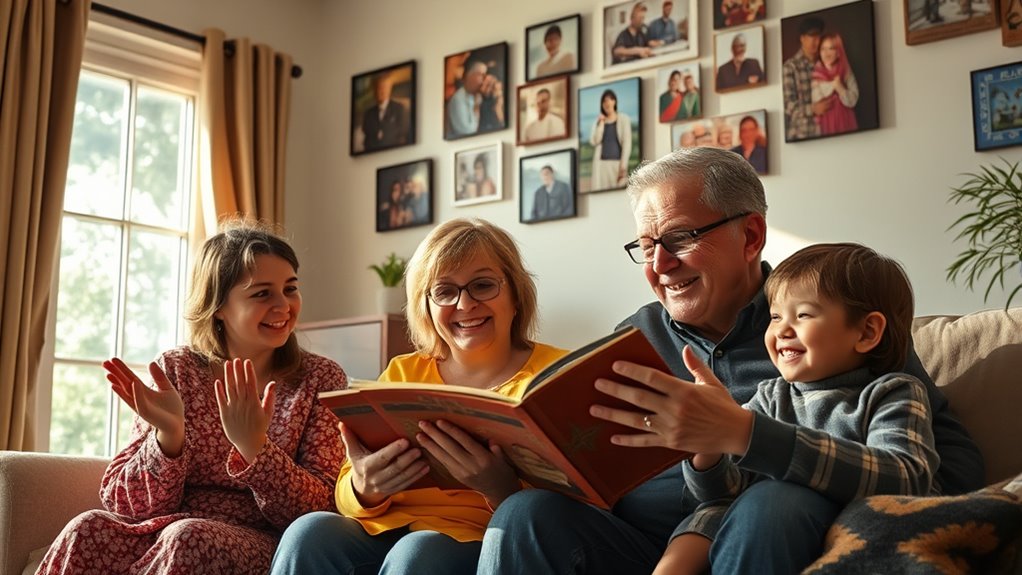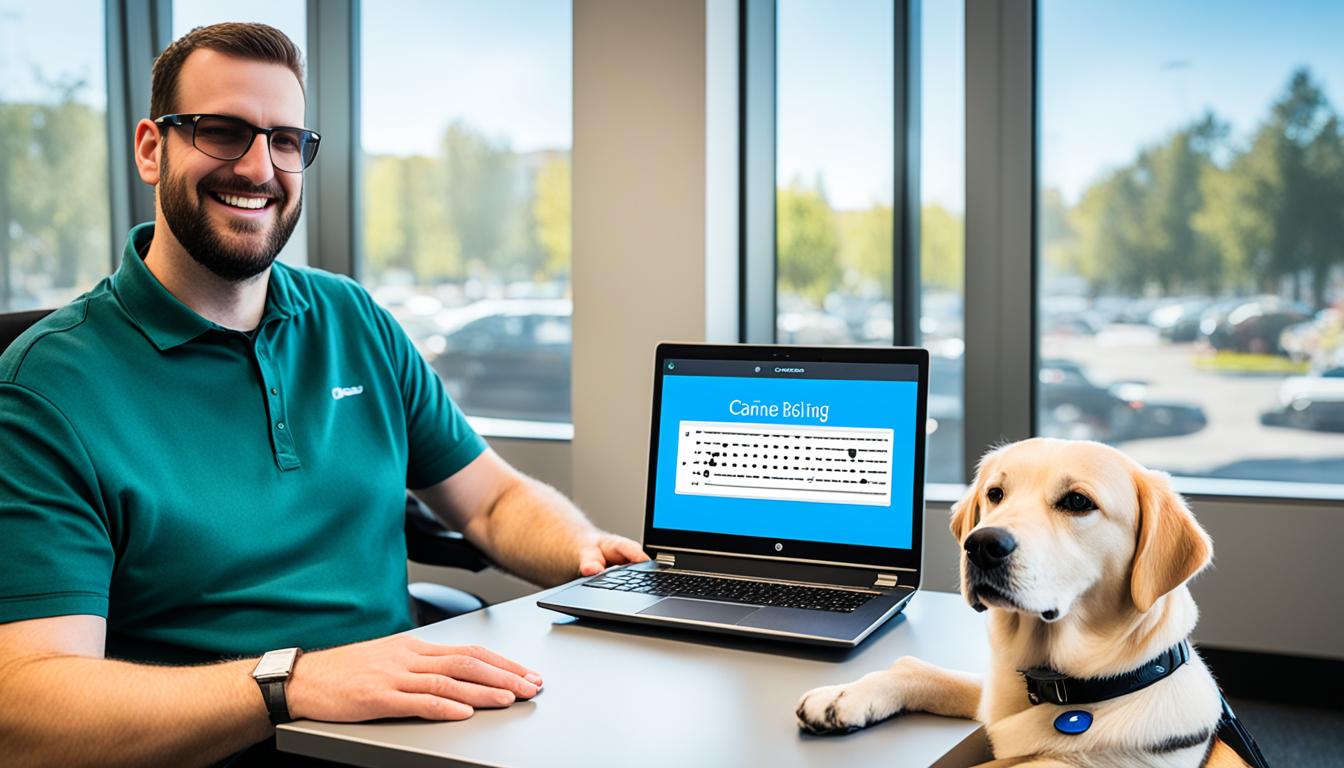Deaf parents share heartfelt stories about growing up in a vibrant, sign language-rich environment that strengthens family bonds. They talk about overcoming social challenges and preserving Deaf culture through traditions and storytelling. Many highlight how they advocate for communication access in healthcare and education, fostering resilience and confidence. Their experiences reveal both obstacles and triumphs in maintaining cultural identity. If you keep exploring, you’ll discover more inspiring insights about their journey and legacy.
Key Takeaways
- Deaf parents emphasize the importance of sign language in building strong family bonds and cultural identity.
- They share challenges faced with social stigma and advocating for communication access in healthcare and education.
- Many highlight resilience developed through shared language, cultural pride, and community support.
- Preserving traditions like storytelling, sign language, and cultural norms is vital for maintaining Deaf heritage.
- They advise future generations to embrace Deaf identity, learn sign language early, and advocate for their rights.
Personal Experiences Growing up With Deaf Parents

Growing up with deaf parents often means you rely on sign language to communicate within your family, creating a unique and close-knit bond.
Growing up with deaf parents fosters a unique, close-knit family bond through sign language communication.
As a child, you quickly learn that your parents need clear visual cues and signs to understand you, fostering strong visual-spatial skills.
You develop a deep appreciation for Deaf culture and shared traditions, which become an essential part of your identity.
However, you might face challenges, such as social stigma or misunderstanding from hearing peers.
Despite these obstacles, your family’s shared language and cultural practices help you build resilience and a strong sense of community.
Your experiences highlight how important it’s for parents to create an environment where communication, cultural connection, and mutual understanding thrive.
Additionally, exposure to visual communication methods enhances your ability to connect effectively and appreciate diverse forms of expression. Understanding communication accessibility plays a crucial role in fostering inclusivity and mutual respect within communities.
Challenges and Triumphs in Family Life

Deaf parents often face significant challenges in family life, especially when communicating with hearing relatives, educators, and healthcare providers. These barriers can impact daily interactions and access to essential information. Despite this, many deaf families develop resilience through shared sign language, cultural pride, and mutual support, turning obstacles into triumphs. Advocating for communication access—like interpreters and assistive devices—is crucial for effective family communication. When communication access is prioritized, families build stronger bonds and create inclusive environments for their children, fostering bilingual development and cultural traditions. Additionally, understanding the history of pinball machines can shed light on how cultural perceptions have evolved over time, influencing accessibility and acceptance. Recognizing the key domains of development in psychology helps families support their children’s emotional, cognitive, and social growth from an early age. Emphasizing communication accessibility is vital to ensure that deaf parents and their children can participate fully in family and community life.
Navigating Healthcare and Communication Barriers

Effective communication in healthcare settings is essential for deaf parents to make informed decisions and participate fully in family medical care. Under the Americans with Disabilities Act (ADA) and the Disabilities Act (ADA), deaf parents are entitled to accommodations like qualified Sign Language interpreters or CART services. To avoid delays, you should request these accommodations in advance, and providers can only claim undue burden if they show significant difficulty or expense. Using Certified Deaf Interpreters (CDIs) alongside ASL interpreters can improve understanding, especially during complex or emotional discussions. Remember, deaf parents have the same rights as hearing parents to access information and participate in medical appointments and counseling. Recognizing and understanding narcissistic traits in healthcare providers can help you advocate more effectively for your needs. Advocacy is key to overcoming communication barriers and ensuring your legal rights are respected. Being aware of communication barriers and how they can impact your healthcare experience enables you to better prepare and seek appropriate support. Additionally, understanding disability rights laws can empower you to address any potential violations or neglect in your healthcare interactions.
Preserving Deaf Culture and Family Traditions

Preserving Deaf culture and family traditions is essential for maintaining a strong sense of identity and community. As a Deaf parent, you pass down sign language, cultural norms, and shared stories that strengthen family bonds and uphold Deaf identity. Engaging with digital resources like community events and storytelling through sign language help keep traditions alive across generations. These practices reinforce pride in your heritage and guarantee that values, language, and customs are transmitted. Incorporating textile art techniques such as storytelling quilts or visual symbols can serve as meaningful ways to preserve and pass down cultural narratives. Utilizing visual storytelling methods can further enhance understanding and engagement in cultural transmission. The Disabilities Act (ADA) supports accessibility, but preserving your culture relies on active efforts within your family to celebrate and share these traditions. Additionally, cultural transmission through oral stories and visual arts ensures that cultural knowledge is preserved even as generations change. Developing cultural preservation initiatives within your community can strengthen these efforts and promote broader awareness. By doing so, you maintain a vibrant collective Deaf heritage, fostering a sense of belonging and cultural continuity that empowers your children and future generations.
Advice and Words of Wisdom for Future Generations

Embracing your identity and culture is the most important advice you can pass down to future generations. Take pride in your Deaf heritage and learn sign language early. This helps you communicate effectively within your family and community, strengthening your connections. Developing communication skills can also empower you to navigate various social situations confidently. Always advocate for your rights and seek the accommodations you need in school and healthcare. Resilience and self-acceptance are essential; facing societal challenges builds character and confidence. Remember, preserving your culture is a continuous effort—pass down traditions, stories, and values to keep your heritage alive. Recognizing metabolic changes associated with different diets can support your health journey and reinforce the importance of cultural practices. Understanding nutritional balance can help you make informed choices that honor both your health and cultural identity. Additionally, being aware of health and wellness strategies tailored for Deaf individuals can enhance your overall well-being. Engaging with healthcare providers knowledgeable about Deaf-specific needs ensures better care and support. By staying true to yourself and embracing your identity, you empower future generations to thrive and stay connected to their roots. Your strength and pride will inspire others to do the same.
Frequently Asked Questions
What Is a Struggle for Children Who Grew up With Deaf Parents?
You might struggle with feeling caught between two worlds—deaf and hearing—and face social isolation or bullying because of misunderstandings.
Communication barriers within your family can lead to frustration and helplessness, especially if proper support isn’t available.
Steering healthcare and education systems can also be challenging, risking misdiagnoses or delays.
Additionally, you often carry the emotional burden of advocating for your parents’ needs in social and institutional settings.
What Are the Drawbacks of Being Deaf With Hearing Parents?
Imagine trying to navigate a maze blindfolded—that’s how it feels growing up deaf with hearing parents. Communication barriers can cause misunderstandings, making you feel isolated.
Without early exposure to sign language or deaf culture, you might miss out on key support and connections. This limits your emotional bonding and access to resources, much like missing pieces in a puzzle, affecting your self-esteem and sense of belonging.
What Challenges Do Parents of Deaf Children Face?
You face many challenges as a parent of a deaf child. You might feel overwhelmed by emotional struggles like grief, guilt, or anxiety about your child’s communication and future.
Accessing appropriate services can be tough, and communication barriers with professionals may cause delays.
Deciding on interventions like cochlear implants adds stress.
Social isolation and stigma in your community can also impact your mental health and your ability to connect with others.
What Percentage of Deaf Babies Are Born to Hearing Parents?
You might be surprised to learn that about 90-95% of deaf babies are born to hearing parents. This highlights a significant majority in this demographic, meaning most families face unique challenges in communication and support.
As a hearing parent, you may feel unprepared or unfamiliar with deaf culture. It’s crucial to access resources and education to foster understanding, effective communication, and strong family bonds with your deaf child.
Conclusion
Your journey with deaf parents is like a vibrant tapestry woven with resilience, love, and tradition. Each thread tells a story of challenges faced and triumphs celebrated. As you carry their legacy forward, remember that your voice adds a new color to this masterpiece. Embrace your unique perspective, and let it shine as brightly as the bond that ties your family together. Your story is a essential part of the beautiful mosaic of deaf culture.










